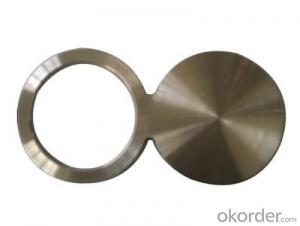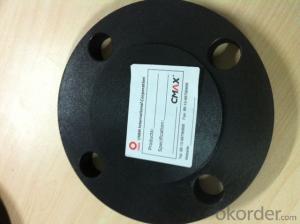STAINLESS STEEL PIPE FORGED FLANGES 304/316 ANSI B16.5
- Loading Port:
- Tianjin
- Payment Terms:
- TT OR LC
- Min Order Qty:
- 1 pc
- Supply Capability:
- 10000 pc/month
OKorder Service Pledge
OKorder Financial Service
You Might Also Like
Package Of Stainless Steel Flange:
PACKED IN PLYWOOD CASES OR PALLETS
Painting Of Stainless Steel Flange:
ANTI-RUST OIL
Marking Of Stainless Steel Flange:
REFER TO MARKING DOCUMENT or AS PER CUSTOMER REQUEST
Shipping Marks Of Stainless Steel Flange:
EACH WOODEN BOX TWO PLASTIC SHIPPING MARKS
Specification Of Stainless Steel Flange:
Carbon Steel Flange Slip On Flange, Plate Flange, Blind Flange, Welding Neck Flange, Socket Welded Flange, Thread Flange, Lap Joint Flange, Long Welding Neck Flange
Size : 1/2"-48"
Wall Thickness.: SCH10-SCH160, SGP , XS, XXS, DIN ,STD
| Name | Stainless Steel Flange |
| Size | 1/2" - 48" |
| Face | RF, FF, RTJ |
| Wall thickness | Sch5-Sch160 XXS,STD,XS, SGP |
| Standard | ASME B16.5, B16.47, BS4504, JIS B2220, API 6A, 11Detc. |
| We can also produce according to drawing and standards provided by customers. | |
| Material | 304, 304L, 316, 316L, 304/304L, 316/316L, EN1.4301, EN1.4404 etc. |
| Packaging | Wooden Cases, wooden pallet , or carton box , or nylog bag and then in wooden cases |
| Surface Treatment | Anti-rust Oil |
| Delivery Time | 20-30 days, after received advance payment. |
| Quality | 100% Heat Treatment, No Welding repair |
| Others | 1.Special design available according to your drawing. |
| 2.anti-corrosion and high-temperature resistant with black painting | |
| 3. All the production process are made under the ISO9001:2000 strictly. | |
| 4. A conformity rate of ex-factory inspection of products. | |
| 5. we have export right , offering FOB , CNF CIF price |
STANDARD & MATERIAL GRADE
STAMDARD Of Stainless Steel Flange
<table style="WIDTH: 838px" cellspaci
- Q:What is the difference between steel pipe and fiberglass pipe?
- Steel pipe and fiberglass pipe differ in terms of material composition, durability, flexibility, and cost. Steel pipe is made of steel, which provides strength and resilience, making it ideal for high-pressure applications and underground installations. Fiberglass pipe, on the other hand, is composed of reinforced plastic fibers, resulting in a lightweight and corrosion-resistant material suitable for above-ground and corrosive environments. While steel pipe offers higher tensile strength, fiberglass pipe excels in its flexibility, allowing for easier installation and reduced maintenance. Additionally, steel pipe is typically more expensive due to the cost of materials and manufacturing processes, while fiberglass pipe is more cost-effective in terms of initial installation and long-term maintenance.
- Q:What is the difference between black steel pipe and galvanized steel pipe?
- The main difference between black steel pipe and galvanized steel pipe lies in their coating. Black steel pipe is untreated and has a dark, matte appearance, while galvanized steel pipe is coated with a layer of zinc to prevent rusting and has a silver, shiny appearance. This coating makes galvanized steel pipes more durable and suitable for outdoor use, while black steel pipes are commonly used for indoor plumbing and gas lines.
- Q:How are steel pipes used in sewage systems?
- Steel pipes are commonly used in sewage systems for their strength, durability, and resistance to corrosion. These pipes are used to transport sewage and wastewater from homes, businesses, and industrial facilities to treatment plants or disposal sites. They are ideal for underground installations due to their ability to withstand high pressure and the weight of the surrounding soil. Additionally, steel pipes can be welded together, providing a seamless and leak-proof system that ensures the safe and efficient transportation of sewage.
- Q:What are the main aspects of precision steel tubes?
- Products according to their application areas are divided into: automotive, precision machinery tubes; power plants, nuclear power tubes; titanium and titanium alloy tubes; chemical tubes; varieties include colored, black; seamless; welding; general and special-shaped
- Q:Can steel pipes be used for wastewater disposal?
- Yes, steel pipes can be used for wastewater disposal. Steel pipes are commonly used in wastewater systems due to their durability, strength, and resistance to corrosion. They can handle the high pressure and flow rates often associated with wastewater and can effectively transport it to treatment plants or other disposal points. Additionally, steel pipes can be coated or lined with materials that provide extra protection against corrosion or chemical reactions with the wastewater, further increasing their longevity and effectiveness in wastewater disposal.
- Q:Can steel pipes be used for underground sprinkler systems?
- Yes, steel pipes can be used for underground sprinkler systems. However, it is important to note that steel pipes are not as commonly used as other materials like PVC or polyethylene due to their susceptibility to corrosion. If steel pipes are chosen for this application, they should be coated or lined to protect them from underground moisture and ensure their longevity.
- Q:How are steel pipes used in the construction of oil storage tanks?
- Steel pipes are commonly used in the construction of oil storage tanks as they provide strength, durability, and corrosion resistance. These pipes are used to connect various components of the tank, such as the walls, roof, and bottom, ensuring a secure and leak-proof structure. Additionally, steel pipes are also used to transport oil within the tank and for the installation of necessary fittings, valves, and other equipment.
- Q:How are steel pipes used in the construction of railway tracks?
- Steel pipes are used in the construction of railway tracks as they provide a strong and durable foundation. They are typically used for the support and reinforcement of the tracks, helping to distribute the weight of the trains and ensuring stability. Steel pipes also play a crucial role in drainage systems, allowing for proper water flow and preventing damage to the tracks.
- Q:How are steel pipes inspected for quality?
- The quality of steel pipes undergoes a thorough examination process involving diverse techniques and standards. Trained professionals conduct visual inspections to scrutinize the pipes for visible defects such as cracks, dents, or surface irregularities. This examination guarantees that the pipes meet the required specifications and are devoid of any visible flaws. Furthermore, non-destructive testing (NDT) methods are utilized to assess the internal and external quality of the steel pipes. Among the commonly used NDT techniques, ultrasonic testing stands out. This method involves transmitting ultrasonic waves through the pipes to detect any internal defects or inconsistencies in the material. It effectively identifies issues such as variations in wall thickness, inclusions, or weld defects that could compromise the pipe's integrity. Another widely employed NDT technique is magnetic particle inspection. By utilizing magnetic fields and iron particles, this method identifies surface cracks or flaws in the steel pipes. It is particularly effective for detecting defects in ferromagnetic materials and can be performed on both the outer and inner surfaces of the pipes. Moreover, hydrostatic testing is frequently conducted to evaluate the strength and pressure resistance of the pipes. This process involves filling the pipes with water or a suitable fluid and subjecting them to a specified pressure to check for leaks or structural weaknesses. This test ensures that the pipes can withstand the intended operational conditions without failing. In addition to these techniques, various quality control measures are implemented throughout the manufacturing process. These measures include material traceability, dimensional checks, and chemical composition analysis. They play a crucial role in ensuring that the steel pipes meet the required standards and specifications, thereby guaranteeing their quality and reliability. In summary, the inspection of steel pipes for quality involves a comprehensive approach encompassing visual inspection, non-destructive testing methods, and quality control measures. These thorough procedures enable the identification of defects, inconsistencies, or weaknesses, ensuring that the pipes meet the necessary quality standards and are suitable for their intended purpose.
- Q:What are the different grades of steel used for manufacturing pipes?
- The different grades of steel commonly used for manufacturing pipes include carbon steel, alloy steel, and stainless steel.
1. Manufacturer Overview |
|
|---|---|
| Location | |
| Year Established | |
| Annual Output Value | |
| Main Markets | |
| Company Certifications | |
2. Manufacturer Certificates |
|
|---|---|
| a) Certification Name | |
| Range | |
| Reference | |
| Validity Period | |
3. Manufacturer Capability |
|
|---|---|
| a)Trade Capacity | |
| Nearest Port | |
| Export Percentage | |
| No.of Employees in Trade Department | |
| Language Spoken: | |
| b)Factory Information | |
| Factory Size: | |
| No. of Production Lines | |
| Contract Manufacturing | |
| Product Price Range | |
Send your message to us
STAINLESS STEEL PIPE FORGED FLANGES 304/316 ANSI B16.5
- Loading Port:
- Tianjin
- Payment Terms:
- TT OR LC
- Min Order Qty:
- 1 pc
- Supply Capability:
- 10000 pc/month
OKorder Service Pledge
OKorder Financial Service
Similar products
New products
Hot products
Hot Searches
Related keywords

































